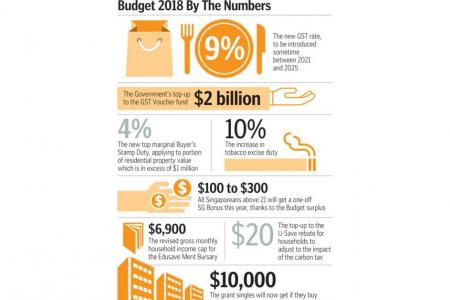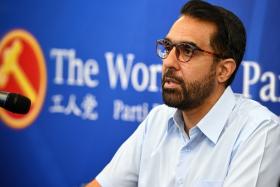GST to go up to 9% between 2021 and 2025
Hike to be deferred by at least three years with help for less well-off and seniors, says Heng in Budget speech
As widely forecast, Finance Minister Heng Swee Keat yesterday confirmed an increase in the Goods and Services Tax (GST) but with a slight twist.
The rise by two percentage points to 9 per cent will be deferred until 2021, or it could stretch until 2025 before taking effect.
Explaining the five-year period, Finance Minister Heng Swee Keat said the timing will depend on "the state of the economy, how much our expenditures grow and how buoyant our existing taxes are".
Delivering his two-hour Budget 2018 speech in Parliament, Mr Heng added that he expects the need to do so to be "earlier rather than later" in the period.
The last hike for GST, which was introduced in 1994, was in 2007 to the current 7 per cent.
The two percentage point increase is expected to boost government revenue by 0.7 per cent of GDP a year and help maintain the increased spending in such sectors as healthcare, infrastructure and security, which Mr Heng said will continue to grow.
"This GST increase is necessary because even after exploring various options to manage our future expenditures through prudent spending, saving and borrowing for infrastructure, there is still a gap," he said.
But he emphasised that the increase will be done in a "progressive manner, as we have always done in the past".
An offset package will be implemented for a period to help Singaporeans adjust to the increase, with more support to be given to lower and middle-income households.
More details of this package will be given after the timing of the increase has been decided.
Additionally, the permanent GST Voucher (GSTV) will be enhanced when the hike kicks in to "provide more help to lower-income households and seniors".
The Government now gives out about $800 million yearly from the GSTV Fund, and it will be boosting the fund by $2 billion this year, said Mr Heng.
The Government will also continue to absorb GST on publicly-subsidised education and healthcare.
Mr Heng also announced other revenue-raising measures including a 10 per cent rise in tobacco excise duty; the introduction of a carbon tax, raising the top marginal buyer's stamp duty (BSD) from 3 per cent to 4 per cent, applying to the portion of residential property value in excess of $1 million.
From Jan 1, 2020, digital services from overseas suppliers will also attract GST, even if they do not have a physical presence in Singapore.
Such imported services include apps, software, online subscription fees and listing fees on electronic marketplaces.
Calling the Budget a "strategic and integrated financial plan to position Singapore for the future", Mr Heng noted major shifts such as "a changing global economic landscape, the emergence of new technologies and our own demographic transition".
On the "natural question" why the Government did not consider tapping into Singapore's reserves instead of raising the GST, Mr Heng warned that if government spending exceeds investment returns, this will eat into the country's "nest egg".
Eventually, the diminished reserves will generate a "progressively smaller stream of income in the years that follow" till they are exhausted.
"This is not the Singapore way," Mr Heng said.
Mr Heng also outlined several other measures to help Singaporeans, such as enhancements to Edusave, boosting some housing grants and a one-off "hongbao" between $100 and $300. (See inside pages.)
CIMB Private Bank economist Song Seng Wun told The New Paper that providing years of lead-up to the GST hike gives the Government a "grace period".
"Nobody likes a rise in taxes but it is what is needed. This grace period gives the Government time to justify what it needs to spend on and make the people understand," he said.
There were also goodies such as higher grants for Singaporeans, including singles, buying resale flats to live with or near their parents.
Mr Heng also announced a one-off "hongbao" of $100 to $300 for all Singaporeans above 21. The SG Bonus, which will cost the Government $700 million, comes from this year's Budget surplus of $9.6 billion.
"It reflects the Government's long-standing commitment to share the fruits of Singapore's development with Singaporeans," he said.
Get The New Paper on your phone with the free TNP app. Download from the Apple App Store or Google Play Store now



